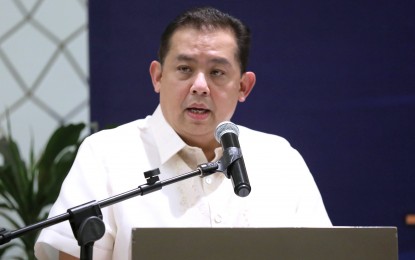
MANILA -- House Speaker Martin Romualdez on Friday assured the House of Representative’s commitment to ramp up efforts on providing the legal framework for the country's digital transformation necessary to foster economic recovery and spur growth.
Romualdez made the assurance following President Ferdinand R. Marcos, Jr.’s participation at the Asia-Pacific Economic Cooperation (APEC) 29th Leaders’ Meeting (AELM) where he cited the need to narrow the digital divide among the region's economies to open more opportunities for cross-border trade and investments and foster inclusive growth.
Romualdez pointed out that the House Committee on Trade and Industry has already approved a consolidated version of the proposed Internet Transaction Act or E-Commerce Law, which is among the 20 priority measures the President mentioned in his State of the Nation Address (SONA).
The bill proposes to create an E-Commerce Bureau to regulate internet commercial activities and protect consumers who engage in online transactions.
“We are also working equally hard for the passage of the proposed e-Government and e-Governance Act, also among the priority measures of President Marcos in his SONA,” Romualdez said.
Last week, the House Committee on Information and Communications Technology held its technical working group to consolidate and fine-tune the provisions of the proposed e-Governance Act and e-Government Act.
Romualdez is the principal author of House Bill (HB) No. 3, or the proposed E-Governance Act of 2022. His co-authors are House Senior Deputy Majority Leader and Ilocos Norte Representative Ferdinand Alexander “Sandro” Marcos, and Tingog Party-list Reps. Yedda Marie Romualdez and Jude Acidre.
In filing HB No. 3, Romualdez said government policies “must be responsive to the needs of our people, rather than burden them with totally avoidable restrictions.”
The passage of these measures, according to Romualdez, will also contribute to providing the necessary environment to help micro, small, and medium-scale enterprises (MSMEs) not only to recover from the effects of the pandemic, but also to grow and prosper.
In his APEC intervention, President Marcos said narrowing the digital divide will “allow disadvantaged segments of our economies to participate in the digital economy and allow our economies to address future work challenges through human resource development.”
The President also cited the initiatives of the Philippines to set the stage for the country to thrive in the digital economy such as the e-Commerce Philippine Roadmap 2022, the Philippine Innovation Act, and the Innovative Start-Up Act.
E-Commerce Philippine Roadmap 22 seeks to make e-commerce synonymous with easy commerce, “as easy as pointing your finger towards a direction, as tapping your fingers on the keyboard, as clicking your mouse, as pressing a button, according to DTI.
On the other hand, the Philippine Innovation Act (Republic Act No. 11293) aims to generate and scale up action in all levels and areas of education, training, research, and development towards promoting innovation and internationalization activities of MSMEs as drivers of sustainable and inclusive growth.
The Innovative Startup Act (RA 11337), signed into law on April 26, 2019, aims to strengthen, promote, and develop an innovative and entrepreneurial ecosystem and culture in the Philippines. (PNA)
